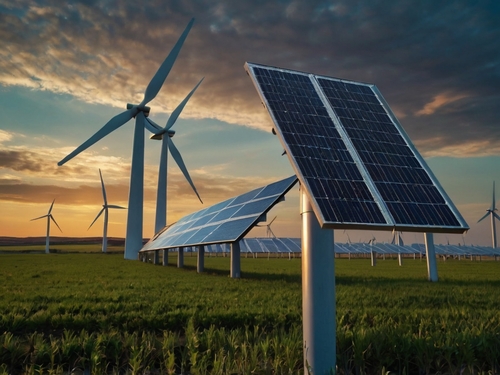Introduction
The Renewable Energy Market is poised for transformative growth by 2031, driven by global efforts to combat climate change and transition to cleaner energy sources. As nations and corporations commit to reducing their carbon footprints, the trends in the renewable energy sector are set to redefine the energy landscape.

Technological Advancements
Technological innovations are at the heart of the renewable energy market’s evolution. Advances in solar photovoltaic (PV) technology, such as perovskite solar cells, promise higher efficiency and lower costs. Wind turbine technology is also progressing, with larger, more efficient turbines capable of generating more power. Energy storage solutions, particularly in battery technology, are crucial for addressing intermittency issues and ensuring a stable energy supply.
Government Policies and Incentives
Government policies and incentives continue to play a pivotal role in the renewable energy market. Many countries have set ambitious renewable energy targets and are providing tax credits, subsidies, and other incentives to encourage investment in renewable projects. The European Union’s Green Deal, aiming for climate neutrality by 2050, is a prime example of policy-driven market growth.
Market Segmentation
The renewable energy market is segmented into various sectors, including solar, wind, hydro, geothermal, and bioenergy. Solar and wind energy dominate the market due to their scalability and cost-effectiveness. However, other segments like geothermal and bioenergy are gaining traction, especially in regions with specific natural resources that favor these technologies.
Regional Analysis
Different regions are contributing to the growth of the renewable energy market in unique ways. North America and Europe are leading the charge with substantial investments and supportive policies. The Asia-Pacific region is emerging as a significant player, driven by China’s aggressive renewable energy goals and India’s expanding solar and wind capacities. Africa and Latin America are also making strides, leveraging their abundant natural resources to address energy access and economic development challenges.
Corporate Commitments
Corporate commitments to sustainability are driving significant investments in renewable energy. Many large corporations are setting ambitious targets for renewable energy procurement, aiming to power their operations entirely with renewable sources. This trend is not only reducing corporate carbon footprints but also driving demand for renewable energy projects and technologies.
Challenges in the Renewable Energy Market
Despite the positive outlook, the renewable energy market faces several challenges. Intermittency issues with solar and wind power require advanced energy storage solutions and grid management systems. High initial capital costs can be a barrier to entry, although these are often offset by lower operational costs over time. Additionally, integrating renewable energy into existing power grids poses technical and logistical challenges.
Opportunities for Growth
The renewable energy market presents numerous growth opportunities. Technological advancements, increased public awareness, and supportive government policies are key drivers. Emerging markets offer significant potential for expanding renewable energy infrastructure, addressing both energy access and economic development. Innovations in energy storage and smart grid technologies are also critical for future growth.
Future Outlook
Looking ahead, the renewable energy market is expected to experience robust growth by 2031. As technology continues to improve and costs decline, renewable energy will become increasingly competitive with traditional fossil fuels. The transition to renewable energy will not only mitigate climate change but also create economic opportunities and enhance energy security.
Conclusion
The Renewable Energy Market trends in 2031 indicate a bright future for sustainable energy. With ongoing technological advancements, supportive policies, and growing corporate commitments, the shift towards renewable energy is inevitable. As the world moves towards a more sustainable future, the renewable energy sector will play a pivotal role in driving this transformation.
No responses yet